Complete Solutions to Exercise of chapter Force of Class 11 book with complete answers and questions
| Class 11 | PHYSICS |
| Chapter | Force |
| MODERN PUBLICATION | Exercise |
| Number Of Questions | 100 |
| Academic Year | 2023-24 |
An elevator weighs 4000kg When the upward tension in the supporting cable is 48000 N what is the upward acceleration? Starting from rest, how far does it rise in 3 seconds ?
View SolutionA truck starts from rest and accelerates uniformly at `2.0 m s^-2`. At t = 10 s, a stone is dropped by a person standing on the top of the truck (6 m high from the ground). What are the:- velocity. (Neglect air resistance.)
View SolutionA truck starts from rest and accelerates uniformly at `2.0 m s^-2`. At t = 10 s, a stone is dropped by a person standing on the top of the truck (6 m high from the ground). What are the:- acceleration of the stone at t = 11s? (Neglect air resistance.)
View SolutionA machine gun fires a bullet of mass 50 g with a velocity `1500 ms^(-1)`. The man holding it, can exert a maximum force of 600 N on the gun. How many bullets can he fire per second at the most ?
View SolutionA circket ball of mass 500 g is mocing with speed of `36km h^(-1)`. It is reflected back with the same speed. What is the impulse applied on it ?
View SolutionA force of 10 N acts on a body for 3 microsecond `(mus)`. Calculate the impulse. If mass of the body is 5g, calculate the change of velocity.
View SolutionA bosy of mass 0.25 kg moving with velocity `12 m s^(-1)` is stopped by applying a force of 0.6 N. Calculate the time taken to stop the body. Also calculate the impluse of this force.
View SolutionA hammer wrighing 1 kg moving with the speed of `10ms^(-1)` strikes the head of a nail driving it 10 cm into a wall. Neglecting the mass of the nail, calculate the acceleration during the impact.
View SolutionA hammer wrighing 1 kg moving with the speed of `10ms^(-1)` strikes the head of a nail driving it 10 cm into a wall. Neglecting the mass of the nail, calculate the acceleration during the impact.
View SolutionA hammer weighing 1 kg moving with the speed of `10ms^(-1)` strikes the head of a nail driving it 10 cm into a wall. Neglecting the mass of the nail, calculate the impulse.
View SolutionA spring balance is attached to the ceiling of a stationary lift. A man suspends a block from the hook of the spring balance and the balance reads 98 N. What will be the reading of the spring balance, if the lift starts moving downward with an acceleration of `2ms^(-2)`?
View SolutionA heavy load of mass 600 kg is placed on the weighing machine lying in a lift. What will be reading of the weighing machine, when the lift is at rest ?
View SolutionA heavy load of mass 600 kg is placed on the weighing machine lying in a lift. What will be reading of the weighing machine, when the lift is moving upwards with an acceleration of `2.2ms^(-2)` ?
View SolutionA heavy load of mass 600 kg is placed on the weighing machine lying in a lift. What will be reading of the weighing machine, when the lift is moving downwards with an acceleration of `2.8 ms^(-2)` ?
View SolutionA heavy load of mass 600 kg is placed on the weighing machine lying in a lift. What will be reading of the weighing machine, when the lift is falling freely due to the rupture of the cable?
View SolutionDuring explosion, a bomb explodes into three pieces. Two fragments, whose masses are 0.8 kg and 0.5 kg fly off with velocities of `10ms^(-1)` and `16ms^(-1)` respectively along the paths at right angles to each other. If the third fragment goes off with a velocity of `24ms^(-1)`, then find its mass and direction of motion w.r.t. the first fragment.
View SolutionTwo masses 7 kg and 12 kg are connected at the two ends of a light inextensible string that passes over a frictionless pulley [Fig.
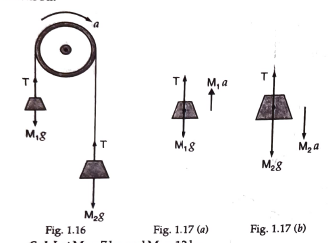 ]. Find the acceleration of the masses and the tension in the string , when the masses are released.
]. Find the acceleration of the masses and the tension in the string , when the masses are released.
View SolutionA horizontal force 600 N pulls two masses 10 kg and 20 kg lying on a frictionless table conneced by a light string find tension in the string if the force is applied on 20 kg mass.
View SolutionTwo blocks, each having, mass 20 kg, rest on a frictionless surface as shown in Fig
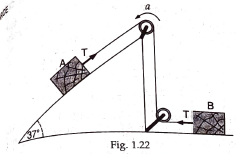 . Assuming the pulleys to be light and frictionless, calculate acceleration of the system. assume `sin theta= 3//5`
. Assuming the pulleys to be light and frictionless, calculate acceleration of the system. assume `sin theta= 3//5`
View SolutionTwo blocks, each having, mass 20 kg, rest on a frictionless surface as shown in Fig Assuming the pulleys to be light and frictionless, calculate the tension in the string.
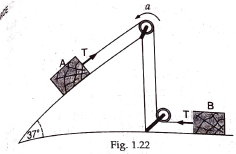 .
.
View SolutionTwo blocks, each having, mass 20 kg, rest on a frictionless surface as shown in Fig Assuming the pulleys to be light and frictionless, calculate the time required for block A to move 1 m down the plane.
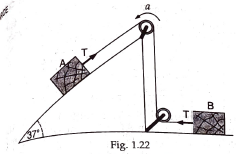 .
.
View SolutionTwo blocks connected by an inextensible string passing over a light frictionless pulley are resting on two smooth inclined planes as shown in Determine the acceleration of the blocks and the tension in the string. Assume the string to be massless. Fig.
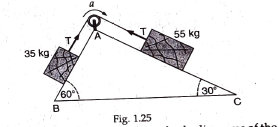 .
.
View SolutionA particle of mass `10^(-2)kg` is moving along the positive X-axis under the influence of a force `F(x)=- K/(2x^2 ')` where `K=10^(-2)Nm^2`. When it is at x=1.0m, its velocity `v=0`. Find its velocity, when it reaches `x=0.50m`.
View SolutionA disc of mass 10g is kept floating horizontally by throwing 10 marbles `s^(-1)` against it from below. If the mass of each marble is 5g, calculate the velocity with which the marbles are striking the disc. Assume that the marbles strike the disc normally and rebound downward with the same speed.
View SolutionA cricket ball of mass 150g is moving with a velocity of `12ms^(-1)` and is hit by a bat so that the ball is turned back with a velocity of `20ms^(-1)`. The force of blow acts for 0.01s on the ball. Find the average force exerted by the bat on the ball.
View SolutionA uniform rope of lrngth L is pulled by constant force F. What is the tension in the rope at a distance `l` from the end, where it is applied ?
View SolutionA piece of uniform string hangs vertically so that its free end just touches horizontal surface of a table. The upper end of the strig is now released. Show that at any instant during the falling of string, the total force on the surface is three times the weight of that part of string lying on the surface.
View SolutionA lift is going up. The total mass of the lift and the passengers is 1500kg. The variation in the speed of the lift is given by the graph as shown in Fig.
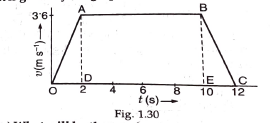 . What will be the tension in the rope pulling the lift at time `t` equal to `11s`.
. What will be the tension in the rope pulling the lift at time `t` equal to `11s`.
View SolutionA lift is going up. The total mass of the lift and the passengers is 1500kg. The variation in the speed of the lift is given by the graph as shown in Fig.
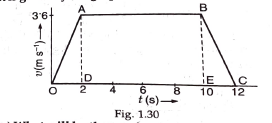 . What will be the tension in the rope pulling the lift at time `t` equal to 6s.
. What will be the tension in the rope pulling the lift at time `t` equal to 6s.
View SolutionA lift is going up. The total mass of the lift and the passengers is 1500kg. The variation in the speed of the lift is given by the graph as shown in Fig.
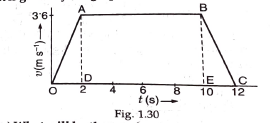 . What will be the tension in the rope pulling the lift at time `t` equal to `1s` ?
. What will be the tension in the rope pulling the lift at time `t` equal to `1s` ?
View SolutionA lift is going up. The total mass of the lift and the passengers is 1500kg. The variation in the speed of the lift is given by the graph as shown in Fig.
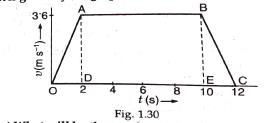 . What will be the average acceleration during the course of the entire motion ?
. What will be the average acceleration during the course of the entire motion ?
View SolutionA lift is going up. The total mass of the lift and the passengers is 1500kg. The variation in the speed of the lift is given by the graph as shown in Fig. What is the height, to which the lift takes the passengers ?.
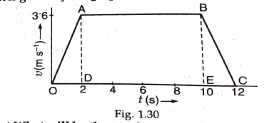 .
.
View SolutionIs force needed to keep a body moving with uniform velocity ?
View SolutionWhat is inertia?
View SolutionHow is inertia related to mass of a body?
View SolutionWhy a fan continues to rotate for sometime even after it is switched off ?
View SolutionIf you jerk a piece of paper under a book quick enough, the book will not move. Why?
View SolutionDefine the term momentum. Give its SI unit.
View SolutionA bullet fired from a rifle is more dangerous than an air molecule hitting a person through both of them have atmost the same speed. Explain.
View SolutionHow does Newton's first law of motion leads to the definition of force?
View SolutionIs Newton's second law `(F=Ma)` always valid. Give an example in support of your answer.
View SolutionThe rate of change of momentum of a body is `5 kg ms^(-1)`. What is the force acting on the body?
View SolutionGive and state SI unit of force.
View SolutionWhat is the difference between mN and nm ?
View SolutionAction and reaction forces do not balance each other. Why?
View SolutionWhat is impulsive force?
View SolutionWhat is the net force on a cork floating on water?
View SolutionWhich is greater-the attraction of 10 kg mass for earth or the earth's attraction for 10 kg mass ?
View SolutionA body is moving along a circular path such that its speed always remains constant. Should there be a force acting on the body ?
View SolutionState principle of conservation of momentum.
View SolutionWhat is an impulse? How is it related to the change in momentum?
View SolutionCan a body remain in state of rest, when external forces are acting on it ? Explain your answer.
View SolutionA body is acted upon by a number of external forces. Can it remain at rest ?
View SolutionIf net force acting on a body is zero, then will the body remain necessarily in rest position?
View SolutionName physical situation, where the mass of body changes with time.
View SolutionWhen are the two bodies said to posses equal masses ?
View SolutionIs a bus moving along a circular track, an inertia frame of reference ?
View Solutionwhat can be said about the motion of the vehicle if a plumb line hanging from its roof drops vertically ?
View SolutionThe assertion mad by the Newton's first law of motion that every body continues in its state of uniform motion in the absence of external force appears to be contradicted in everyday experience. Why ?
View SolutionAccording to Newton's first law of motion, a body moving with a uniform speed along a stright line should continue moving. In practice, a body in motion stops after some time. Explain the reason.
View SolutionExplain why:- a horse cannot pull a cart and run in empty space.
View SolutionWhy do we fall forward, when a moving body suddenly stops ? Explain, stating the law required.
View SolutionWhy the passengers fall in backward direction when a bus suddenly starts moving from the rest position.
View SolutionA stone when thrown on a glass window smashes the window pane to pieces, but a bullet from the gun passes through making a clean hole. Why ?
View SolutionWhy are porcelain objects wrapped in paper or straw before packing for transportation?
View SolutionWhy are shockers used in scooter and cars ? Explain.
View SolutionA man suspends a fish from the spring balance held in his hand and the balance reads 9.8 N. While shifting the balance to his other hand, the balance slips and falls down. What will be the reading of the balance during the fall ?
View SolutionA spring weighing machine inside a stationary lift reads 50 kgf, when a mans stands on it. What would happen to the scale reading, if the lift is moving upward with constant velocity ?
View SolutionA spring weighing machine inside a stationary lift reads 50 kgf, when a mans stands on it. What would happen to the scale reading, if the lift is moving upward with constant acceleration ?
View SolutionIn which case will a rope have the greater tension : two men pull the ends of the rope with forces F equal in magnitude but opposite in direction.
View SolutionIn which case will a rope have the greater tension :(a) One end of the rope is fastened to a fixed support and the other is pulled by a man with a force 2F.(b) Two men pull the ends of the rope with forces F equal in magnitude but opposite in direction.
View SolutionA rope passes over a pulley, which is sufficiently high. Two monkeys of equal weights climb the rope from opposite ends, one of then climbing quickly than the other, relative to the rope. Which of the monkeys will reach the top first ? Assume that pulley is weightless, while the rope is weightless as well as inextensible.
View SolutionA massless rope is passed over a frictionless pulley. A monkey holds on to one end of the rope and a mirror having the same weight as the monkey, is attached to the other end of the rope at the monkey's level. Can the monkey get away from his image seen in the mirror by climbing up the rope.
View SolutionA massless rope is passed over a frictionless pulley. A monkey holds on to one end of the rope and a mirror having the same weight as the monkey, is attached to the other end of the rope at the monkey's level. Can the monkey get away from his image seen in the mirror by climbing down the rope.
View SolutionA massless rope is passed over a frictionless pulley. A monkey holds on to one end of the rope and a mirror having the same weight as the monkey, is attached to the other end of the rope at the monkey's level. Can the monkey get away from his image seen in the mirror by by releasing the rope ?
View SolutionWhat is inertia ? Why do we call the Newton's first law as the law of inertia ? Explain.
View SolutionDefine the term inertia. Explain three types of inertia with examples.
View SolutionWhat are the S.I. and C.G.S units of force? Give a relationship between them.
View SolutionHow does Newton's first law of motion leads to the definition of force?
View SolutionNewton's second law gives the measure of
View SolutionState Newton's second law of motion. How it helps us to measure force ? State its CGS and SI units.
View SolutionState Newton's laws of motion. Hence, derive the relation `vecF=M veca`, where the symbols have their usual meanings.
View SolutionDiscuss consequences of Newton's second law of motion.
View SolutionState Newton's second law of motion. How it helps us to measure force ? State its CGS and SI units.
View SolutionState the law of conservation of angular momentum.
View SolutionDerive the law of conservation of linear momentum from Newton's third law of motion.
View SolutionTwo masses 7 kg and 12 kg are connected at the two ends of a light inextensible string that passes over a frictionless pulley [Fig.
 ]. Find the acceleration of the masses and the tension in the string , when the masses are released.
]. Find the acceleration of the masses and the tension in the string , when the masses are released.
View SolutionHow does the weight of a man standing in a lift changes, when the lift accelerates upwards with an acceleration `a` ?
View SolutionHow does the weight of a man standing in a lift changes, when the lift accelerates downwards with an acceleration `a` ?
View SolutionDefine concurrent forces and describe equilibrium of concurrent forces.
View SolutionD,E,F are mid-points of the sides of the triangle ABC, show that for any point O, the system of concurrent forces represented by `vec(OA),vec(OB),vec(OC)` is equivalent to the system represented by `vec(OD),vec(OE),vec(OF)`.
View SolutionState Newton's second law of motion. Hence, derive the equation of motion `F=Ma`. From it, obtain the unit of force in `SI`.
View SolutionNewton's second lasw of motion is not the real law of motion.(Yes//No)
View SolutionNewton's second law gives the measure of
View SolutionState principle of conversation of momentum.
View SolutionState principle of conversation of momentum.
View SolutionState principle of conversation of momentum.
View SolutionState principle of conversation of momentum.
View SolutionState principle of conversation of momentum.
View SolutionState and prove the principle of conversation of linear momentum. Apply this law, to explain why a rocket goes up, when fired.
View Solution
Exercise questions and complete solutions for chapter Force of MODERN PUBLICATION of Class 11